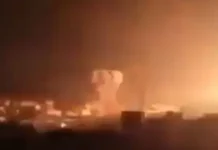Tens of Thousands Protest Netanyahu’s Judicial Overhaul: A Show of Force in Israel
Introduction
In a remarkable display of dissent, tens of thousands of protesters flooded the streets of Jerusalem on a scorching Saturday evening. Simultaneously, hundreds of thousands of Israelis gathered in Tel Aviv and other cities to voice their opposition to Prime Minister Benjamin Netanyahu’s proposed judicial overhaul. The controversial legislation, aimed at limiting the powers of unelected judges, has sparked widespread concern, with former security chiefs and military reservists joining the chorus of dissent.
The March into Jerusalem
The protest march into Jerusalem saw a sea of blue and white Israeli flags, with marchers completing a grueling 70-kilometer (45-mile) trek from Tel Aviv to Israel’s parliament, the Knesset. The procession, which grew from hundreds to thousands as it progressed, ended at the Knesset, where the protesters set up camp ahead of Monday’s anticipated vote.
Tel Aviv and Other Cities Join the Protest
As Jerusalem witnessed the main march, hundreds of thousands of protesters also thronged the streets of Tel Aviv, the country’s business and cultural capital. Similar demonstrations occurred in Beersheba, Haifa, and Netanya. The overwhelming participation highlighted the widespread concern over the potential implications of the judicial overhaul.
The Supporters and Opponents of the Overhaul
Netanyahu and his far-right allies argue that the judicial overhaul is necessary to address what they perceive as the excessive powers of unelected judges. They claim that such measures will restore balance and safeguard democratic principles. However, critics of the plan voice deep apprehension, asserting that it could undermine the country’s system of checks and balances and potentially lead to authoritarian rule.
International Reactions
The proposed judicial overhaul has also attracted attention beyond Israel’s borders. U.S. President Joe Biden has publicly urged Netanyahu to reconsider the plan and seek a broader consensus. The involvement of the international community reflects the significance of the issue at hand and its potential impact on the nation’s democratic values.
Military Reservists and Former Security Chiefs Speak Out
The discontent with the proposed legislation extends to Israel’s defense forces. A fast-growing number of military reservists, including key units, have vowed to stop reporting for duty if the plan is approved. The concern is that this could compromise the country’s security interests and readiness. More than 100 former security chiefs, including retired military commanders, police commissioners, and intelligence agency heads, have also signed a letter urging Netanyahu to halt the legislation. These respected figures, some of whom are political rivals of Netanyahu, express serious misgivings about the potential consequences of the overhaul on Israel’s military strength and security.
The Parliament’s Decision
The Israeli parliament is set to vote on the measure on Monday, which would limit the Supreme Court’s oversight powers by preventing judges from striking down government decisions based on their perceived “unreasonability.” Proponents argue that this would prevent the judiciary from excessively intervening in elected officials’ decisions. However, opponents argue that such a move could lead to arbitrary decision-making, improper appointments, and open the door to corruption.
Grassroots Protest Movement
The ongoing protests against the judicial overhaul have been described as the most sustained and intense demonstrations in Israel’s history. The widespread participation of Israelis from diverse backgrounds indicates the broad discontent with the proposed changes.
Conclusion
The fervent opposition to Prime Minister Benjamin Netanyahu’s judicial overhaul is a testament to the passion and concern of tens of thousands of protesters and countless Israelis. As the nation braces for a crucial vote, the implications of the proposed legislation weigh heavily on the minds of the people. The outcome will undoubtedly shape Israel’s future and its commitment to democratic values and governance.
FAQs
- What is the purpose of the proposed judicial overhaul? The proposed judicial overhaul aims to limit the powers of unelected judges in Israel’s legal system, with the intention of restoring balance and reducing what some perceive as judicial overreach.
- Why are military reservists opposing the plan? A growing number of military reservists are opposing the plan, fearing that it could compromise the country’s security interests and readiness.
- What do opponents of the overhaul fear? Critics of the plan fear that it could undermine the system of checks and balances in Israel and potentially pave the way for authoritarian rule.
- What has been the international reaction to the proposed legislation? U.S. President Joe Biden has urged Prime Minister Benjamin Netanyahu to seek a broader consensus and reconsider the plan.
- What are the key concerns of the protesters? Protesters see the overhaul as a power grab that may deepen Israel’s control of the occupied West Bank and perpetuate controversial draft exemptions for ultra-Orthodox men, among other concerns.






























